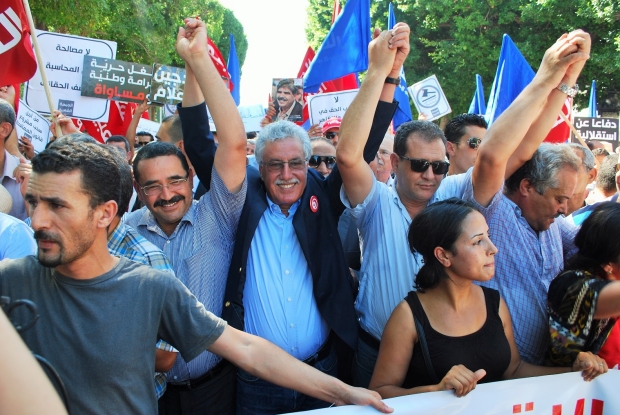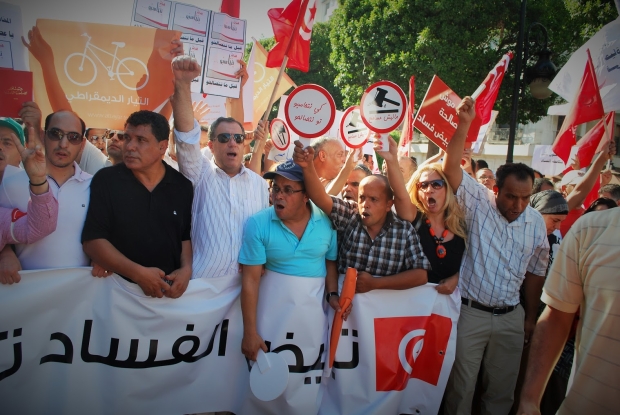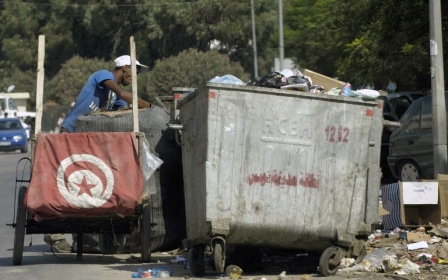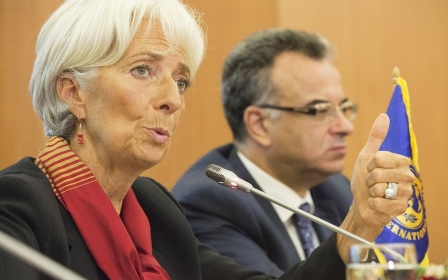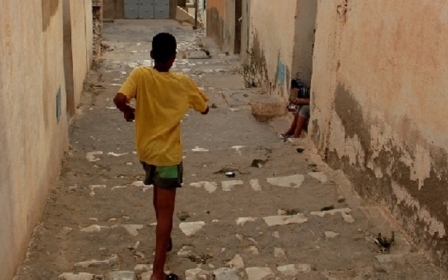Tunisians rally against government reconciliation bill
TUNIS - On Saturday, over 1,000 Tunisians marched down Habib Borguiba Avenue, protesting against against the Economic Reconciliation Bill. The planned bill, supported by a majority of members of parliament, would grant former officials of the pre-revolution regime and other Tunisian citizens immunity for the economic crimes they committed before the revolution.
The offenders would have to return the money they stole, totalling approximately $3.5bn, and would then receive immunity from future prosecution. Civil society activists view the planned law as a step backward for the struggle toward holding the government accountable and ensuring equitable society.
Political parties from across the spectrum rallied their constituents in separate marches.
At 2 PM local time, the National Front, a largely socialist workers party began the first march. Led by party head Hama Hammami, members of the National Front rallied from the end of Avenue Habib Borguiba, past the Ministry of Interior, all the way to the 9 April Clocktower.
Hundreds of party members, both old and young, chanted slogans of frustration with reconciliation of what they perceive as cronies.
Raja Omri, 23, said she was there because "the government wants us to forgive the ones who stole money, but we want to bring them to justice. We want the money back for our Tunisia. We are all equal. We are all one hand."
Shouts of "we are not scared. The street is for the people," echoed throughout the march.
This slogan was in direct response to the government's warnings of potential terrorist attacks from the period of 11 September through 14. Officials from the Ministry of Interior leaked to the Tunisian media that they had picked up evidence of potential car bombing attacks during this time period.
Friday marked the 14th anniversary of the 9/11 attacks in the United States, and three years ago on 14 September Salafis set fire to and vandalized the US Embassy, just days after Ambassador Chris Stevens was killed in the attack on the American Embassy in Libya.
The government tried to use these ominous dates and also the state of emergency status to prevent the protests, and up until 11 September had decided to forbid the protests. Only after an emergency meeting between National Front leader Hama Hammami and Prime Minister Habib Essid were the protesters given the go-ahead to take to the streets.
A coalition of social democrat supporters also marched. Their protests were striking for how much they taunted the Islamist Ennahda party, often mocking the party's leader, Rashid Ghannouchi. National Front members also expressed their distaste with secular Nida Tounes and Ennahda, the two parliamentary parties responsible for the new bill.
Although one fight did break out between Ennahda supporters dissatisfied with their party's stance on the bill and anti-Ennahda protesters, the day was largely drama free. Uniformed police and plainclothes officers were omnipresent and whether the threats were real or fabricated, no attacks ever occurred.
The protests went along peacefully, but some young Tunisians were disappointed by how they were organised.
Wafa Ben Hassine, a Tunisian-American international human rights lawyer, observed the marches and said: "I was disappointed. This was so disorganised and way too politicised. I saw very few independent protesters there."
Many of the protesters hailed from different political factions, but different local unions also demonstrated. Ghassen Bouazzi, president of the General Union of Tunisian Students, joined the march and rallied with other young Tunisians against the bill.
Bouazzi believes the protests were important because "they protect the next generation from falling into the same cycle of corruption".
When questioned whether the return of money from the regime cronies would stimulate the economy, he responded: "That's not a good argument. The money that would come back would just go back into the pockets of the same people."
On 1 September, police cracked down on another protest against the same bill. Bouazzi was arrested and his colleague, the secretary general of the student union, was brutally beaten.
In spite of all of this intimidation, Bouazzi marched on 12 September and even said: "I want to run for political office. The revolution was made by the youth. We need to struggle and resist. We want to change from the old way of doing things. Not the Islamist way, not the old regime way, but our way."
If his philosophy is any indication of the future path of Tunisia, then the country's government may just be able to maintain its democratic values going forward.
New MEE newsletter: Jerusalem Dispatch
Sign up to get the latest insights and analysis on Israel-Palestine, alongside Turkey Unpacked and other MEE newsletters
Middle East Eye delivers independent and unrivalled coverage and analysis of the Middle East, North Africa and beyond. To learn more about republishing this content and the associated fees, please fill out this form. More about MEE can be found here.


